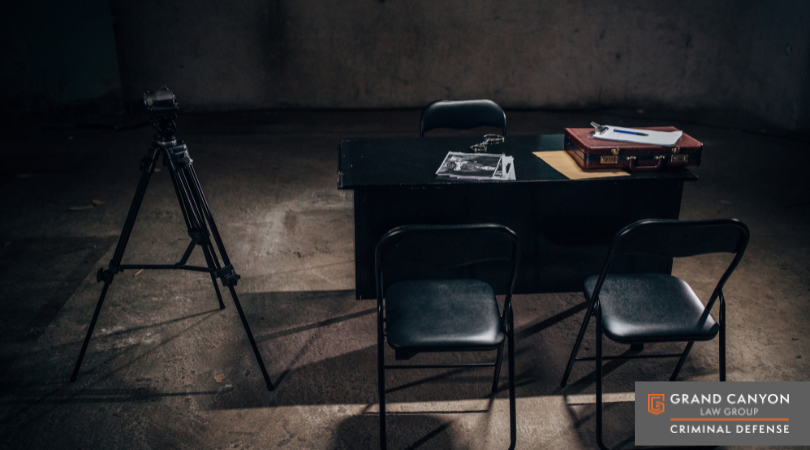Protecting Your Rights During Police Questioning in Arizona

What to Know in Maricopa, Pinal, and Coconino Counties
Being questioned by the police in Arizona, particularly in Maricopa, Pinal, or Coconino counties, can feel overwhelming. Whether you’re in Phoenix, Mesa, Flagstaff, or Casa Grande, it’s essential to understand your constitutional rights and how to protect yourself during police interviews. This guide will help you navigate the process, avoid common pitfalls, and ensure your rights are upheld.
Understanding Your Constitutional Rights
Both the U.S. Constitution and the Arizona Constitution protect you from being coerced, forced, or manipulated into giving a statement during police questioning. Knowing your rights can prevent you from unintentionally incriminating yourself.
The Right to Remain Silent
You are not obligated to answer any questions posed by law enforcement. To invoke this right, clearly state, “I choose to remain silent and would like to speak to an attorney.” Once you assert this right, police must stop questioning you unless you voluntarily decide to speak.
The Right to an Attorney
You have the right to legal representation at any time during police questioning. If you request an attorney, officers in Phoenix, Flagstaff, or Casa Grande are required to cease all questioning until your lawyer is present. This ensures you have professional guidance to protect your rights.
What Police Cannot Do
While police are allowed to investigate crimes, there are clear legal boundaries they must follow during questioning. Knowing what officers are not permitted to do can help you recognize when your rights are being violated.
No Physical Force or Intimidation
Officers cannot use physical harm, intimidation, or threats to force you into providing a statement or confession.
No Threats of Harsher Charges
Police cannot threaten to file more severe charges if you refuse to cooperate. Such threats are considered coercive and are not allowed under Arizona law.
No Promises of Leniency
Law enforcement cannot promise lighter penalties or favorable treatment in exchange for a confession. These tactics are illegal and undermine the fairness of the investigation.
Psychological Tactics Police May Use
While physical coercion is prohibited, police can legally use psychological strategies to pressure you into talking. These tactics are designed to create discomfort and manipulate your responses.
Lying About Evidence
Officers in Mesa or Phoenix may falsely claim they have DNA evidence, video footage, or eyewitness testimony linking you to a crime. These falsehoods aim to make you feel cornered and push you to confess.
Providing False Information
In Flagstaff or other parts of Coconino County, police might claim a co-defendant has implicated you or present inaccurate details about the investigation. These methods are meant to elicit incriminating responses.
Implied Consequences
Although police cannot directly threaten you, they might imply that staying silent will worsen your situation, encouraging you to talk without legal representation.
High-Pressure Tactics Used in Arizona
Interrogations in Maricopa, Pinal, and Coconino counties often involve high-pressure strategies aimed at breaking down resistance and obtaining a confession.
Isolation
Police may isolate you from family or legal counsel, creating a sense of vulnerability that encourages cooperation.
Friendly Tone
Officers may take on a conversational or sympathetic tone to build rapport. This approach is designed to lower your guard and make you feel comfortable sharing information.
Creating Urgency
You might be told that speaking now will “clear things up” or “help your case.” This urgency is often misleading and can pressure you into making statements that could harm your defense.
Protecting Yourself If You Feel Pressured
If you feel overwhelmed or pressured during a police interview, it’s essential to take steps to safeguard your rights.
- Stay Calm and Polite Maintain a calm and respectful demeanor. Do not argue with officers or show frustration, as this could escalate the situation.
- Invoke Your Rights Clearly state, “I choose to remain silent and want to speak to an attorney.” This invocation ensures that your silence cannot be used against you and that questioning must stop until your lawyer arrives.
- Avoid Answering Questions Even seemingly casual comments can be used against you later. Refrain from answering any questions without legal representation.
- Contact an Attorney Immediately Consulting with an experienced lawyer familiar with Arizona law can help protect your rights and ensure that any statements you provide are not coerced or improperly obtained.
Why You Need a Lawyer During Police Questioning
Having an attorney present during questioning in Maricopa, Pinal, or Coconino counties is critical to protecting your rights. A lawyer can:
- Challenge Coerced Statements: If police pressured you into confessing, your attorney can argue that the statements are inadmissible in court.
- Evaluate Police Conduct: Your lawyer will examine whether officers violated your constitutional rights during the interview.
- Provide Aggressive Defense: Whether negotiating with prosecutors or representing you in court, your attorney will prioritize securing the best outcome for your case.
How Grand Canyon Law Group Can Help
At Grand Canyon Law Group, we specialize in protecting individuals questioned by law enforcement in Maricopa, Pinal, and Coconino counties, including cities like Phoenix, Mesa, and Flagstaff. We understand the tactics police use and are dedicated to ensuring your rights are upheld.
Why Choose Us?
- Experienced Defense: Our attorneys have extensive experience handling cases involving police questioning and constitutional rights.
- Aggressive Advocacy: We fight against unlawful police tactics to protect your rights.
- Compassionate Guidance: We provide thoughtful and empathetic support throughout the legal process.
Contact Us Today
If you’ve been questioned by police in Phoenix, Flagstaff, Casa Grande, or any city in Maricopa, Pinal, or Coconino counties, and feel your rights were violated, don’t wait. Call Grand Canyon Law Group at (480) 573-6441 for a confidential consultation. Let us protect your rights and help you navigate the complexities of Arizona’s legal system.
